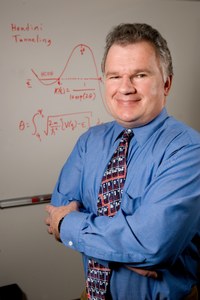Visiting professorships in 2014
The Liebig-College invites every year visiting research professor, who give top-caliber lectures and seminars complementary to the themes of the JLU research groups. In 2014 our visiting research professors were:
Prof. Wesley D. Allen (University of Georgia, Athens) |
|
 |
Professor Allen's research addresses general theoretical development and diverse computational applications of molecular quantum mechanics. He investigates a broad spectrum, such as C-Si-custer, tunneling, structure investigations of biomolecules, matrixisolation. Professor Allen was a visiting professor from 01.07 - 01.08. |
Dr. Uwe Bäumler (Clariant, Industrial Park Hoechst) |
|
| Dr. Uwe Bäumler studied chemistry at the Friedrich-Alexander University of Erlangen-Nürnberg and started his career in the chemical industry in 1994. He has been a plant manager at Clariant for several years, and gained experience in the process development, pilot plant, project management and production. | |
Prof. Michael Harmata (University of Missouri, Columbia) |
|
 |
Professor Harmata is known for his famous [4+3]-Cycloadditions. Furthermore he is developing new chiral Kagan's ether and Troeger's base centers for applications in catalysis and is constructing new chiral benzothiazine ligands for asymmetric catalysis. Professor Harmata was a visiting professor in the time period of 30.08 - 01.10. |
Dr. Emilka Obijalska (University of Łódź, Poland) |
|
|
Dr. Obijalska is a fluoroorganic chemist and therefore interested in the application of (fluoroalkyl)silanes in organic synthesis, the preparation of fluorinated amino alcohols, and heterocyclic compounds. Furthermore she focuses on the preparation of diverse fluoral derivatives and their application in the synthesis of heterocyclic compounds. She is also interested in asymmetric synthesis in general, especially in asymmetric catalysis of Cinchona-alkaloids. Dr. Obijalska was our Liebig-Lecturer from 22.08-19.09. |
|
Prof. Daniel Seidel (University Rutgers, Piscataway) |
|
 |
Professor Seidel is interested in the development of new concepts for asymmetric catalysts (protonated thioureas). Furthermore he focusses on the development of new reactions that generate quickly complex structures from simple starting materials (C-H activation). Professor Seidel was our guest from 01.04 - 27.06. |
Professor Alex M. Szpilman (Technion - Israel Institute of Technology, Haifa) |
|
|
|
Professor Szpilman focuses on the development of new ways of forging chemical bonds in context of asymmetric catalysis. He is also interested in creative step-economical ways to synthesize natural products or biologically active molecules. Professor Szpilman was our Liebig-College professor from 13.09 to 26.09. |


